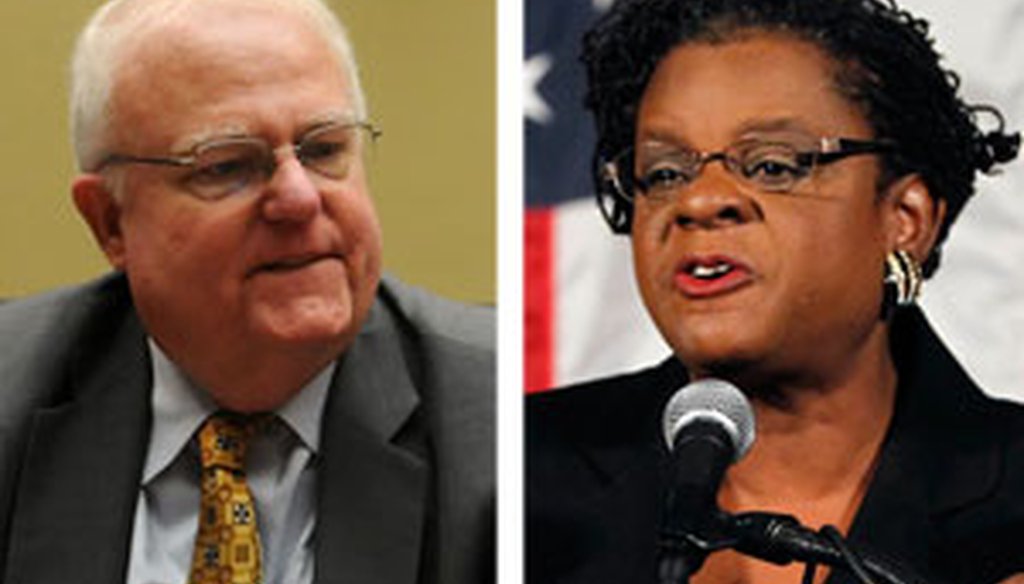Stand up for the facts!
Our only agenda is to publish the truth so you can be an informed participant in democracy.
We need your help.
I would like to contribute

Rep. Jim Sensenbrenner, Republican of Menomonee Falls, and Rep. Gwen Moore, Democrat of Milwaukee
Democrat Gwen Moore of Milwaukee and Republican Jim Sensenbrenner of suburban Menomonee Falls are polar opposites politically.
But the two members of Congress share a passion for the landmark Voting Rights Act and its protection of racial minorities.
In early 2013, Sensenbrenner found his longstanding and key support for the 1965 law highlighted repeatedly by liberals such as Moore as the U.S. Supreme Court took up an Alabama county’s challenge to a crucial enforcement section of the act.
A closer look, though, shows that while Moore and Sensenbrenner agree on saving that provision, they disagree strongly on one of the ways it’s been used.
Voter ID laws are at the heart of the disagreement, and the Moore-Sensenbrenner split illustrates some of the arguments on display in the court case.
On the day of the court’s oral arguments in Shelby County vs. Holder, Moore reiterated her view that voter ID and other laws backed by Republicans threaten voting rights protected by the law.
"In this past election cycle, we have seen a return to the same old discriminatory practices, with over 37 states introducing voting changes … that could negatively impact voters," Moore said on Feb. 27, 2013.
Sensenbrenner, for his part, has called the Voting Rights Act the most "successful civil rights act" ever passed by Congress, and in 2006 he said "racial discrimination in the electoral process continues to exist and threatens to undermine the progress that has been made over the last 40 years."
Specifically, he has advocated for strong prohibitions on the use of legislative redistricting to block people from electing what he calls "the preferred candidates of their choice." He’s also spoken out against practices such as locating polling places in a manner to discourage voting.
But Sensenbrenner has also backed what he calls "common-sense efforts to ensure the identity and citizenship of voters," including photo ID laws.
In fact, Sensenbrenner wrote in a 2012 op-ed piece that Attorney General Eric Holder’s characterization of some voter ID laws as a modern poll tax is reckless and reflects a "profound and potentially malicious misrepresentation of the Voting Rights Act."
At issue is the Justice Department’s use of Section 5 of the act, the "preclearance requirement," which prohibits states with a history of discrimination from making changes in their voting procedures without first demonstrating that the change will not deny a person the right to vote based on their race. Most of the affected states are in the South.
In the oral arguments in February, the comments of several justices suggested that Section 5 could be struck down or altered as the court considers Shelby County’s argument that it no longer discriminates against voters and should be freed to make voting changes without federal oversight.
We should make it clear that Sensenbrenner has strongly backed Section 5 and continues to support it.
But like other conservatives he objected when President Obama’s Justice Department in 2012 used it to block Republican-backed voter-ID laws in Texas and South Carolina. Those actions were just two of the 2,400 state and local voting changes the department has opposed under the section since 1982, Bloomberg news noted.
In the op-ed, Sensenbrenner continued: "Nothing in the Voting Rights Act’s legislative history supports the argument that it was enacted to defeat all efforts to determine whether those who cast ballots in state and federal elections are eligible to do so. The legislation was enacted to remedy forms of racial discrimination -- literacy exams, moral character requirements and subjective interpretation tests -- relied upon to disenfranchise minority voters."
His bottom line: "The Voting Rights Act was not passed to disenfranchise lawful voters by permitting ineligible voters to corrupt the balloting process."
Moore and critics of voter ID have a different take on the issue. They cite studies showing that minorities, students and seniors are less likely to have a photo ID. Some amount of voter suppression results when ID requirements are added, and GOP claims of identity fraud are overblown, they argue.
Moore has co-sponsored a bill that she says would prohibit election officials from requiring individuals to provide photo ID for the purposes of obtaining or casting a ballot in federal elections.
"My bill simply prohibits the most restrictive and oppressive way of ensuring identity," Moore said of the bill.
How does all this play out in how Moore and Sensenbrenner view the current Supreme Court case?
Sensenbrenner, who led the 2006 reauthorization of the Voting Rights Act, was among several House Judiciary Committee members who filed briefs in Shelby County vs. Holder in support of the constitutionality of Section 5.
And on Feb. 27, 2013, he reiterated his backing of Section 5, saying it "remains essential to the continued protection of minorities’ right to vote in covered districts. I stand proudly by my colleagues in protecting all Americans' most fundamental right."
Moore is on board with saving Section 5.
But Moore, it bears repeating, has a somewhat different agenda in mind for it: going after states that have implemented what she sees as discriminatory voter ID laws.
How does Sensenbrenner explain his view?
On the eve of the Supreme Court arguments, Sensenbrenner put it this way to MSNBC:
"Photo ID laws, I think, are color-blind," he said. "There is not the overwhelming evidence that, for example, voter ID or early voting discriminate on a race-based matter."
Our Sources
U.S. Rep. Gwen Moore, "Gwen Moore expresses support for Voting Rights Act," press release, Feb. 27, 2013
Op-ed, Rep. Jim Sensenbrenner, "Politicizing the Voting Rights Act," as published in Politico, July 30, 2012
Bloomberg, "Voting Rights Act Questioned as Top Court Weighs Rollback,"Feb. 27, 2013
MSNBC, "GOP Rep. backs voting restrictions and Voting Rights Act," Feb. 26, 2013
Milwaukee Journal Sentinel, "Voting Rights Act has passionate, strong advocate in Sensenbrenner," April 19, 2009
Office of Rep. Jim Sensenbrenner, statements on Voting Rights Act, accessed Feb. 27, 2013
Interview with Ben Miller, Rep. Sensenbrenner’s communications director, Feb. 28, 2013
Interview with Nicole Y. Williams, senior adviser-communications director, Rep. Moore, Feb. 27, 2013
PolitiFact Wisconsin, "Does Wisconsin’s new voter ID law ‘disenfranchise’ voters?" June 12, 2011
U.S. Department of Justice, Section 5 of the Voting Rights Act, accessed Feb. 27, 2013
U.S. Rep. Jim Sensenbrenner, House floor statement on Voting Rights Act Extension, July 13, 2006
Brennan Center for Justice, "Voting Law Changes: Election Update," Oct. 28, 2012













































